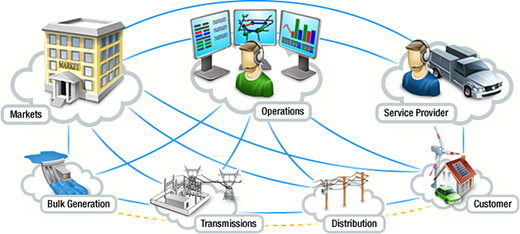01. 10. 2019
Smart Grids: Communication and Electrical Systems joining forces for a digital future
By Dr José Luis Domínguez-García, IREC
The energy sector (especially the electrical) is changing its paradigm. This change is led by the disruption occurred in both communication and electrical system. These includes of the renewable energies, energy storage, the integration of technologies of information and communication (TIC) and internet, which has ignited the evolution of the classic distribution grid to the Smart Grid, and still continue evolving to the future Digital Grid.
Additionally, several classic loads have become controllable and new active agents have arisen with the aim of participating in the grid management, like consumers which have evolved to prosumers, electric vehicles or energy storage systems; including large consumers as hospitals and tertiary buildings (by managing its generators and the thermal consumptions of the building). These new technologies have provided new capabilities (enhanced controllability and observability of the grid, better management, increased flexibility, etc.), making the grid “smarter” with enough intelligence to be able to make self-decisions.

But, not all that glitters is gold, and this disruption also posed new challenges, still unknown in the electrical systems, but very well known in Computer Science as cybersecurity. The electrical system always made use of communication systems but normally under private and isolated networks, which could be only approached by connecting directly to it. The use of the internet to share information creates the bridge to this. Thus, the electrical system must be able to manage two different worlds (at different layers) as the physical and the cyber are.
In addition, this new paradigm is creating a strong dependency among both worlds, since the communication network requires energy supply to work, but also a problem on communications may lead to misleading information about the grid status.
In this regard, increasing resilience and coordinated cross-sectorial operations are of great relevance. Thus, RESCCUE is providing solutions and answers to such questions. Finally, it is worth noting that security of the electrical system (as critical infrastructure) is a must, and both interdisciplinary and intersectoral research must be part of the solution.
